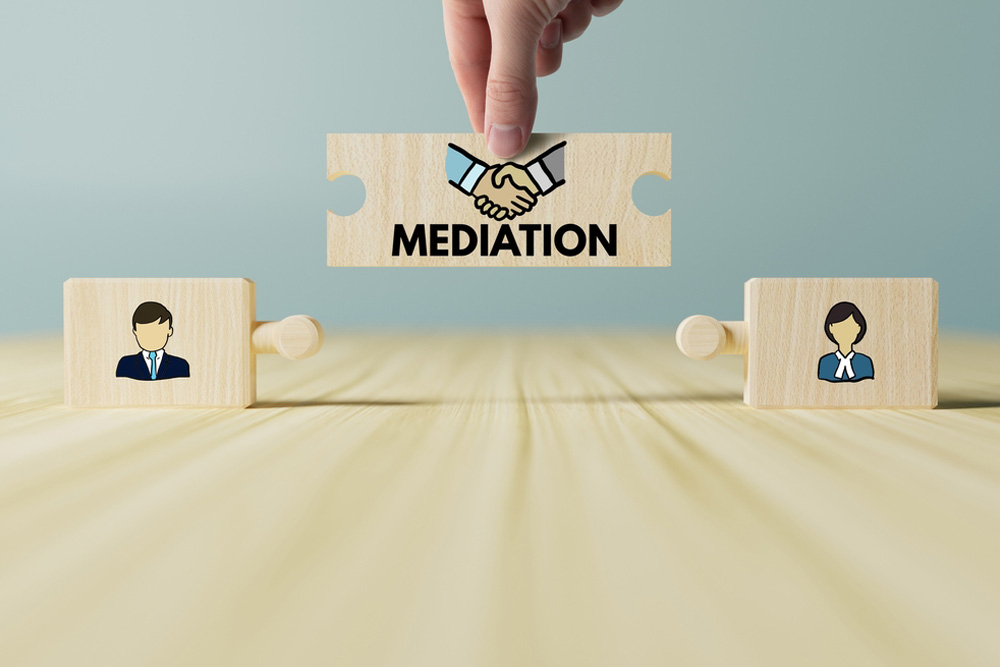




Mediation Lawyer San Diego
In a time when the traditional definitions of family are expanding and relationships are evolving, so too must the legal processes that support them. Mediation has emerged as a powerful and empathetic alternative to courtroom litigation—especially for families who value privacy, control, and respectful collaboration. At Enright Family Law in San Diego, we recognize that modern families need flexible, inclusive, and compassionate legal solutions. Mediation is often the right answer.
What Is Mediation?
Mediation is a voluntary dispute resolution process in which a neutral third party—called a mediator—facilitates communication and negotiation between two parties. In family law, this commonly involves spouses or co-parents who are separating or divorcing. Unlike a judge in court, a mediator does not make decisions for the parties but helps them reach their own agreements on issues such as child custody, property division, and spousal support.
This collaborative approach often leads to more sustainable outcomes and helps preserve relationships—something especially important when children are involved.
Why Modern Families Choose Mediation
The rise of blended families, co-parenting arrangements outside of marriage, LGBTQ+ partnerships, and domestic partnerships means traditional legal approaches don’t always fit modern family dynamics. Mediation allows families to create customized agreements that reflect their real-life situations.
Some of the key reasons families choose mediation include:
- Privacy and Confidentiality: Unlike court hearings, mediation sessions are private and confidential.
- Flexibility: Mediation can be scheduled around the parties’ lives, and solutions are not limited by rigid legal standards.
- Control Over Outcomes: Both parties participate in crafting the final agreement, which often results in better long-term compliance.
- Less Adversarial: Mediation fosters collaboration, not confrontation, making it especially useful when ongoing co-parenting is necessary.
- Faster and More Affordable: Mediation typically resolves disputes more quickly and with lower costs than litigation.
Common Family Law Issues Addressed Through Mediation
Mediation can help resolve a wide range of family law issues, including:
Divorce Settlements
Rather than navigating a contentious courtroom divorce, many couples opt for mediation to work out:
- Division of assets and debts
- Spousal support or alimony arrangements
- Retirement account and investment division
Child Custody and Visitation
Mediation is particularly effective for creating parenting plans that prioritize the well-being of the children while accommodating the schedules and lifestyles of both parents. Custody and visitation arrangements made in mediation often last longer and lead to fewer post-judgment conflicts.
Child Support
A mediator can guide parents through discussions about child support in a way that reflects the unique financial needs of their children and the realities of each parent’s income and expenses.
Modifications to Existing Orders
As life changes, so do the needs of families. Mediation can help parties revisit and revise existing custody, support, or visitation agreements without the need for a lengthy court process.
Prenuptial and Postnuptial Agreements
Mediation offers a thoughtful and non-confrontational way for couples to create agreements that protect each party’s interests before or during a marriage.
Mediation vs. Litigation: What’s the Difference?
While litigation can be necessary in some situations—such as cases involving abuse, coercion, or complete lack of cooperation—it often escalates conflict and increases emotional and financial strain. In contrast, mediation fosters a solution-focused environment where both parties can express their concerns and work together.
Litigation is governed by legal procedures and court schedules, which can delay resolution. Mediation, on the other hand, is more informal, often quicker, and generally results in solutions tailored to each family’s specific needs.
Is Mediation Right for You?
Mediation is an excellent option if:
- You and the other party are open to communicating respectfully.
- There is a shared goal of reaching a fair and workable agreement.
- You want to protect your children from the stress of litigation.
- You prefer to keep your personal matters private.
- You value cost-effective and time-efficient legal solutions.
However, mediation may not be appropriate if there is a history of domestic violence, extreme power imbalances, or unwillingness to participate in good faith.
The Role of a Mediator
A good mediator does more than just guide conversation—they facilitate understanding, help identify issues, and keep negotiations focused on resolution. Mediators are trained to remain neutral and ensure that both parties have an equal voice. At Enright Family Law, our mediators are experienced family law professionals who understand the emotional and practical dynamics of modern relationships.
Our mediation process involves:
- Initial Consultation: Understanding your goals and confirming that mediation is appropriate.
- Joint Mediation Sessions: Facilitated discussions to resolve the issues at hand.
- Drafting the Agreement: Once agreement is reached, we help formalize it into a legally binding document.
- Filing With the Court (If Needed): Finalizing the agreement in accordance with California law.
Legal Representation During Mediation
Even though mediators are neutral, both parties are encouraged to seek independent legal counsel before signing any final agreement. This ensures that the terms are fair and that each party fully understands their rights and responsibilities. Enright Family Law can represent clients during mediation or act as the mediator, depending on your needs.
Mediation and Modern Families
Families today do not always look like those of the past. Some involve co-parenting between unmarried partners, others include step-parents or multiple guardians, and many are led by LGBTQ+ individuals or couples. Mediation allows these diverse family structures to be respected in the legal process by creating flexible, inclusive agreements that courts may not otherwise be equipped to handle with nuance.
By offering a customized, respectful, and child-focused process, mediation honors the integrity of each family’s unique story.
How We Can Help
At Enright Family Law in San Diego, we are committed to supporting modern families through transitions with dignity and compassion. Whether you’re going through a separation, planning a parenting arrangement, or seeking a way to resolve conflict outside of court, our mediation services are designed to protect your peace and prioritize your future. We bring a modern, inclusive approach to every case—recognizing that your family deserves more than a one-size-fits-all solution. Let us help you move forward with clarity, respect, and strength.


